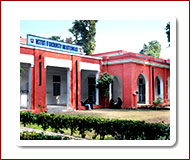Post graduate Courses
M.Phil in Forensic Sciences
Forensic biologists examine blood and other bodily fluids, hair, bones, insects and plant and animal remains to help identify victims and support criminal investigations.
Using technology in the lab and in the field, forensic biologists collect and analyze biological evidence found on clothing, weapons and other surfaces to determine the time and cause of death.
They keep detailed logs and write reports about what they find. Attention to detail is critical, because a single mistake can cause the evidence to be thrown out of court. Senior-level forensic biologists may testify in court about their findings.
Forensic biologists may become experts in:
- DNA analysis
- Forensic anthropology
- Forensic pathology
- Forensic entomology
- Forensic botany
- Biological chemistry
In addition to helping solve crimes, forensic biologists may investigate environmental contamination or other public health threats.
COURSES
Course No. |
Credit Hrs. |
Title of Course |
FS-1001 |
3(3-0) |
Principles of Forensic Science |
FS-1002 |
3(2-1) |
Mammalian Molecular Biology |
FS-1003 |
3(2-1) |
Biological Evidence and Serology |
FS-1004 |
3(2-1) |
Forensic Analysis of DNA |
FS-1005 |
4(3-1) |
Drug Biotransformation & Molecular Mechanism of Toxicology |
FS-1006 |
3(3-0) |
Advanced Criminalistics |
FS-1007 |
3(3-0) |
Blood Distribution and Spatter |
FS-1008 |
4(3-1) |
Forensic Toxicology |
FS-1009 |
4(3-1) |
Forensic Anthropology |
FS-1010 |
3(3-0) |
Forensic Genetics |
FS-1011 |
3(3-0) |
Forensic Immunology |
FS-1012 |
4(4-0) |
Forensic Medicine |
FS-1013 |
3(3-0) |
Environmental Forensics |
FS-1014 |
3(3-0) |
Forensic Entomology |
FS-1015 |
2(2-0) |
Literature Survey |
FS-1016 |
2(1-1) |
Laboratory QA/QC |
FS-1019 |
1(0-1) |
Special Problem |
FS-1020 |
1(1-0) |
Seminar |
|


